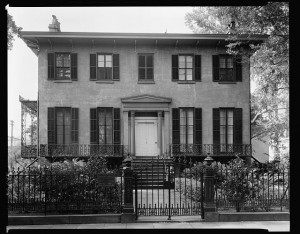Just six months after his father Andrew died and left him a very large inheritance, William Mackay Low married Juliette “Daisy” Gordon. It was a complicated courtship and Daisy neither liked nor trusted the man who was to be her father-in-law.
Andrew Low had emigrated as a teenager from Scotland to Savannah, Georgia. Eventually, he accumulated so much money in the cotton and shipping businesses that he was for a time the wealthiest man in the bustling city and for many miles around. Despite enjoying every physical luxury, he suffered the loss of two wives and a son. In the early 1870s he moved to England and kept his children close by him. His death in 1886 was both a blow and a liberation for his daughters and his son, William.
The precise size of the fortune Andrew Low left was a matter of great speculation to those who knew him, especially Savannahians. Low had been at the center of Savannah society, had married into an established local family, and had raised his children among them in a beautiful house on Abercorn Street. Like other elite Savannahians, he had sympathized with the Confederate cause during the Civil War.
The Ipswich Journal (Ipswich, England), of Tuesday, August 10, 1886, announced that Andrew Low’s estate was worth “upwards of £617,000.” In today’s money, that is £52,100,000 or $81,850,000.
Of that, Low willed £50,000 (or £4,220,000 or $6,600,000 today) to each of his five daughters, and half as much to his grandson.
He left, in today’s money, a yearly annuity of $7,000 for his African-American servant, who died too soon to benefit from it.
And he provided a good deal of financial support to Savannah charities. In today’s money, Andrew Low gave $120,000 to the Union Society; $47,880 to the Episcopal Orphans Home; $24,000 each to the Widows’ Society, the Catholic Female Orphan Asylum, and the Female Orphan Asylum. Did Andrew Low, like most men of his stature and era, know his Bible and its many injunctions to care for widows and orphans? Or did he, twice widowed and caring for motherless children, feel a sad kinship with the bereft?
Subtracting the few other gifts he left, everything else went to his only living son, William. In today’s money, that total amounted to $45,276,500.
Daisy, who had been courted by a moderately wealthy man, found herself married to a millionaire. What William Low did with his inheritance probably would not have pleased his hard-working, parsimonious father, Andrew Low, the gruff Scot with a soft spot for widows and orphans.
_____
Photo of the Low House from the Library of Congress Photo Collection.
For more on the Low House and a portrait of the young Andrew Low, see their website: www.andrewlowhouse.com
For more on the Low family, read Jennifer Guthrie Ryan and Hugh Stiles Golson, Andrew Low and the Sign of the Buck (Savannah: Frederic C. Beil Publishing, 2011).


